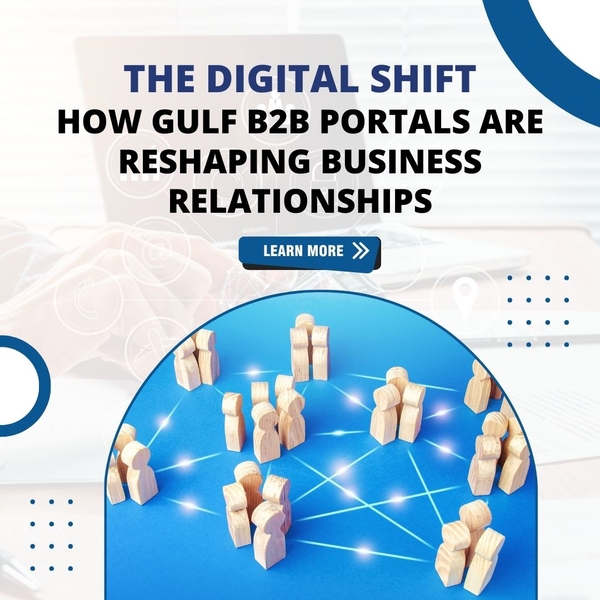
News & Events
The digital shift in the Gulf region, driven in part by the emergence of Gulf B2B (business-to-business) portals, has had a profound impact on how business relationships are formed and maintained. These portals are reshaping the dynamics of business interactions, fostering greater efficiency, transparency, and collaboration. Here's how Gulf B2B portals are transforming business relationships:
1. Efficient Networking: Gulf B2B portals provide a centralized platform for businesses to discover and connect with potential partners, suppliers, distributors, and customers. This efficient networking reduces the time and effort required to establish new business relationships.
2. Global Reach: These portals enable businesses in the Gulf to expand their reach beyond their geographic boundaries. They can connect with international partners and customers, facilitating cross-border business relationships.
3. Diverse Business Ecosystem: B2B portals bring together a diverse range of businesses from various industries and sectors. This diversity enriches the business ecosystem, allowing companies to explore partnerships and collaborations with organizations they might not have encountered otherwise.
4. Transparency: Gulf B2B portals promote transparency by providing comprehensive information about products, services, pricing, and transaction histories. This transparency builds trust between businesses, fostering stronger and more reliable relationships.
5. Real-time Communication: Many B2B portals offer real-time communication tools such as messaging systems and chatbots. These tools facilitate instant communication between businesses, improving responsiveness and collaboration.
6. Data-Driven Insights: B2B portals often incorporate data analytics and reporting features. Businesses can leverage these insights to better understand their partners' behaviors, preferences, and market trends, enabling more informed decision-making.
7. Streamlined Procurement and Sales: B2B portals streamline the procurement process for buyers and make sales processes more efficient for sellers. This operational efficiency enhances the overall business relationship.
8. Personalized Recommendations: Some portals use artificial intelligence (AI) and machine learning algorithms to provide personalized recommendations to users. This feature helps businesses discover relevant partners and opportunities more effectively.
9. Supplier Diversity: Businesses can access a wide array of suppliers and service providers on B2B portals. This diversity allows them to choose partners that align with their specific needs and goals.
10. Industry-Specific Connections: Specialized B2B portals cater to specific industries or niches, allowing businesses to connect with partners who have expertise and experience in their particular sector. This specialization enhances the quality of business relationships.
11. Risk Mitigation: B2B portals often provide tools and resources for assessing the credibility and reliability of potential partners. This risk assessment capability helps businesses make informed decisions when entering into new relationships.
12. Resilience to Disruptions: The digital nature of B2B portals ensures business continuity even during disruptions like the COVID-19 pandemic. Businesses can maintain relationships and transactions without the need for physical meetings.
13. Cost Reduction: B2B portals can reduce costs associated with traditional networking events, travel, and marketing efforts. This cost reduction allows businesses to allocate resources more efficiently.
In summary, Gulf B2B portals are reshaping business relationships by promoting efficiency, transparency, and collaboration. They are becoming essential tools for businesses in the Gulf region to adapt to the digital era, expand their networks, and build stronger and more productive partnerships with both domestic and international counterparts.